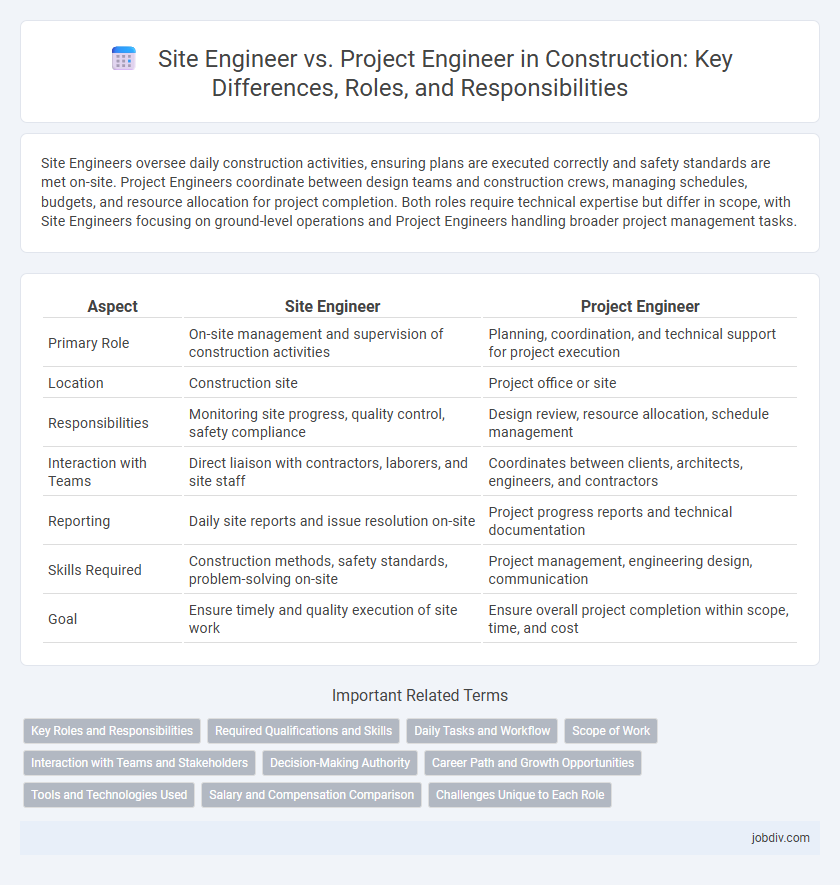Site Engineers oversee daily construction activities, ensuring plans are executed correctly and safety standards are met on-site. Project Engineers coordinate between design teams and construction crews, managing schedules, budgets, and resource allocation for project completion. Both roles require technical expertise but differ in scope, with Site Engineers focusing on ground-level operations and Project Engineers handling broader project management tasks.
Table of Comparison
| Aspect | Site Engineer | Project Engineer |
|---|---|---|
| Primary Role | On-site management and supervision of construction activities | Planning, coordination, and technical support for project execution |
| Location | Construction site | Project office or site |
| Responsibilities | Monitoring site progress, quality control, safety compliance | Design review, resource allocation, schedule management |
| Interaction with Teams | Direct liaison with contractors, laborers, and site staff | Coordinates between clients, architects, engineers, and contractors |
| Reporting | Daily site reports and issue resolution on-site | Project progress reports and technical documentation |
| Skills Required | Construction methods, safety standards, problem-solving on-site | Project management, engineering design, communication |
| Goal | Ensure timely and quality execution of site work | Ensure overall project completion within scope, time, and cost |
Key Roles and Responsibilities
Site Engineers oversee daily field operations, ensuring adherence to design specifications, safety standards, and project timelines while coordinating with subcontractors and labor teams. Project Engineers focus on planning, resource allocation, and technical support, managing project documentation, and liaising between clients, contractors, and suppliers to ensure project objectives are met. Both roles require strong problem-solving skills, but Site Engineers work on-ground for quality control, whereas Project Engineers handle broader project coordination and technical management.
Required Qualifications and Skills
Site Engineers require a bachelor's degree in civil engineering, strong knowledge of construction methods, and proficiency in site management and safety regulations. Project Engineers need a background in engineering, excellent project management skills, and expertise in budgeting, scheduling, and coordination among multiple teams. Both roles demand problem-solving abilities, effective communication, and the capacity to use engineering software such as AutoCAD and Primavera.
Daily Tasks and Workflow
Site Engineers oversee on-site construction activities, ensuring compliance with design specifications, safety standards, and quality control. Project Engineers coordinate between design teams, suppliers, and site staff to manage project schedules, resources, and technical documentation. Both roles involve problem-solving and progress reporting, but Site Engineers focus on hands-on supervision while Project Engineers emphasize planning and communication across project phases.
Scope of Work
Site Engineers manage on-site activities, including supervising construction processes, ensuring compliance with safety standards, and coordinating labor and materials delivery. Project Engineers focus on project planning, budgeting, and communication between stakeholders to maintain schedules and quality control. The Site Engineer's scope is primarily field-based execution, while the Project Engineer oversees technical and administrative project aspects.
Interaction with Teams and Stakeholders
Site Engineers primarily coordinate daily on-site activities, ensuring seamless communication between construction crews, subcontractors, and safety officers to maintain project timelines. Project Engineers engage more broadly with design teams, clients, and procurement departments, translating technical plans into actionable tasks and resolving cross-disciplinary challenges. Effective collaboration between Site and Project Engineers enhances project delivery by aligning on-site execution with overall project objectives and stakeholder expectations.
Decision-Making Authority
Site engineers hold decision-making authority primarily on operational issues, managing daily field activities, resolving on-site technical problems, and coordinating with contractors to ensure construction quality and schedule adherence. Project engineers possess broader decision-making power encompassing project planning, resource allocation, budget management, and strategic coordination among multiple teams to achieve overall project objectives. The distinction in decision-making authority highlights the site engineer's focus on on-the-ground execution versus the project engineer's role in project-wide oversight and control.
Career Path and Growth Opportunities
Site Engineers typically focus on on-site management, quality control, and coordination with contractors, offering growth opportunities toward senior site management or site superintendent roles. Project Engineers handle project planning, budgeting, and communication between stakeholders, which can lead to positions such as project manager or construction manager. Both career paths provide specialized skills but project engineers often have broader leadership growth potential due to their involvement in overall project execution.
Tools and Technologies Used
Site engineers primarily utilize surveying instruments, AutoCAD, and project management software like MS Project for on-site measurements and real-time progress tracking. Project engineers rely heavily on Building Information Modeling (BIM), Primavera P6, and advanced scheduling tools to coordinate multidisciplinary teams and resources effectively. Both roles integrate mobile apps and cloud platforms to enhance communication and ensure accurate data sharing throughout the construction lifecycle.
Salary and Compensation Comparison
Site Engineers typically earn between $60,000 and $85,000 annually, reflecting their hands-on role in on-site management and technical supervision. Project Engineers often command higher salaries, ranging from $75,000 to $110,000, due to their broader responsibilities in planning, coordination, and project execution oversight. Compensation packages for Project Engineers may include performance bonuses and higher benefits, aligning with their critical role in project success and stakeholder management.
Challenges Unique to Each Role
Site Engineers face challenges in managing on-site logistics, ensuring safety compliance, and addressing unexpected ground conditions that can delay construction timelines. Project Engineers confront difficulties in coordinating multidisciplinary teams, maintaining budget control, and aligning project milestones with client specifications. Both roles demand rigorous problem-solving skills, but Site Engineers prioritize real-time issue resolution, while Project Engineers focus on strategic planning and resource allocation.
Site Engineer vs Project Engineer Infographic

 jobdiv.com
jobdiv.com